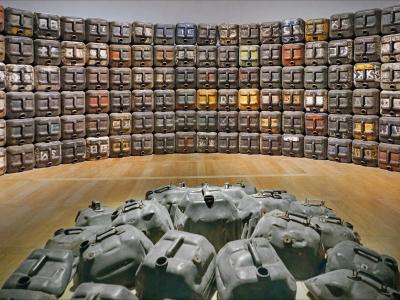
Decolonising Modernism(s)
A one day symposium coordinated by Dr Arka Chattopadhyay and Dr Sourit Bhattacharya.
Register to attend in-person or virtually: https://decolonisingmodernisms.eventbrite.co.uk
This one-day symposium comes in the wake of the centennial year of 1922 when T. S. Eliot’s The Waste Land and James Joyce’s Ulysses ushered in a new era of ‘High Modernism’ in European literary history. What the Eurocentric discussions of 1922 Modernism often forget is that Rabindranath Tagore’s book of genre-bending texts, Lipika, was published in the same year, as was his play, ‘Muktodhara’ (‘The Waterfall’). If a Nobel laureate like Tagore can fall through the cracks, we can imagine the situation with other less visible writers in India’s multiple linguistic traditions, and the rest of the world! Modernism is not one and it didn’t happen only in Europe. In 100 years since 1922, we have acknowledged modernisms in the plural as “coeval” global literary developments. Laura Doyle and Laura Winkiel’s framework of ‘Geomodernisms’ and Sophie Sieta’s work on the little magazines, offering a global network of modernisms, are important instances. The recent publication of the global modernisms anthology, edited by Alys Moody and others have widened its scope beyond Europe, deep into South and East Asia. With the emergence transnational modernisms and world literature studies, we have come to examine the cultural politics of how literature travels across national borders and makes homes in ‘host cultures.’
The purpose of this symposium is to decolonise modernism(s) by approaching it afresh from the perspective of world literature(s) and looking at the diversity of identity categories like race, class, caste, gender, ethnicity, nationality and diaspora. In addition, we will focus on the ‘webzine’ as an alternative publishing platform for creating a transnational modernist network. The papers interrogate the existing canon by injecting new works and question the process of canonization by reconsidering the canonical works from counter-canonical perspectives. This epistemic decolonisation is the fulcrum for the symposium. Daniel Hartley’s paper complicates the divide between the modern and the pre-modern by bringing in peasant identity as a class-dimension to ‘ground’ modernism. Hannah Simpson decolonises the canon of absurdist theatre as she addresses the historicity of these plays and their link with anti-imperial struggles. Norman Ajari broaches the crucial race question by reading George S. Schuyler’s novel Black Empire with a focus on Afrofuturism and the antinomies of the Black radical tradition. Priyanka Tripathi turns our gaze to Dalit Indian women’s writings in English to trace the relation between hegemonic masculinity and caste. Shalini Sengupta stays with Indian women’s writing but foray into the diasporic context to highlight their engagement with form, language and meaning in an experimental quest that approaches life beyond the human. Aryanil Mukherjee shares his journey of coming up with the first online magazine in South Asian languages—Kaurab Online and makes connections between modernist experimentalism and alternative publishing.
We will discuss these multifarious dwellings of modernism(s) in multiple geographies to show how it diversifies itself according to race, class, caste, gender and the publishing platform. The symposium will address the urgent need to plasticize modernisms and observe how literary traditions of modernism are dialectically reinvented in a transnational and decolonial movement. The symposium will be accompanied by a digital exhibition of the webzine, Kaurab Online.
Schedule
10:00 AM: Welcome
10:15 AM: Opening Remarks: Dr. Arka Chattopadhyay and Dr. Sourit Bhattacharya.
10:30 -11:45 AM: Panel 1: Reorienting the Modernist Canons [25 minutes papers and 15 minutes Q&A]
1. Daniel Hartley (Durham University): “Grounding Modernism: The Cultural Stakes of the 21st-Century Agrarian Question”
2. Hannah Simpson (University of Edinburgh): “Decolonising the Theatre of the Absurd.”
11:45 AM – 12 Noon: Tea Break
12:00 -1:15PM: Panel 2: Identities in Modernism [25 minutes papers and 15 minutes Q&A]
3. Norman Ajari (University of Edinburgh): “Black Internationalism and the Prehistory of Afrofuturism: on George Schuyler’s Black Empire.”
4. Priyanka Tripathi (IIT Patna): “The Oppressed Oppressors?: Multidimensional Masculinity and the Depiction of Men in Select Indian Fiction from Dalit Women Writers.”
1:15-2:30PM: Lunch Break
2:30-3:45PM: Panel 3: Avenues of Modernism [25 minutes papers and 15 minutes Q&A]
1. Shalini Sengupta (University of Vienna): “Diasporic Modernisms and Indian Women’s Writing in English.”
2. Aryanil Mukherjee (poet and engineering mathematician, Cincinnati, USA): “Advancing Experimental Bengali Poetry and Poetics in Digital Domain.” (online)
3:45-4:00PM: Kaurab Online Digital Exhibition
4:00-4:30PM: Closing Remarks and Discussion
This event is supported through the Susan Manning Workshop Fund at the Institute for Advanced Studies in the Humanities, University of Edinburgh.
